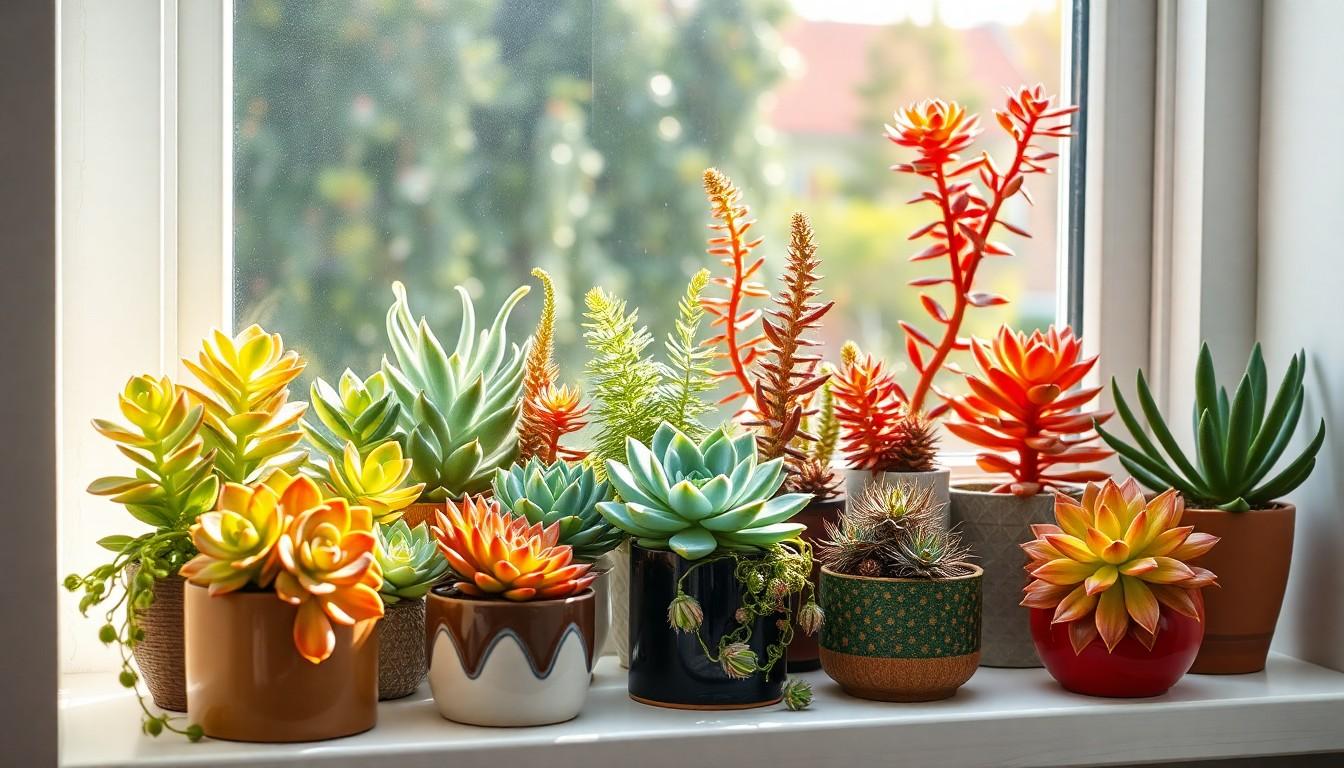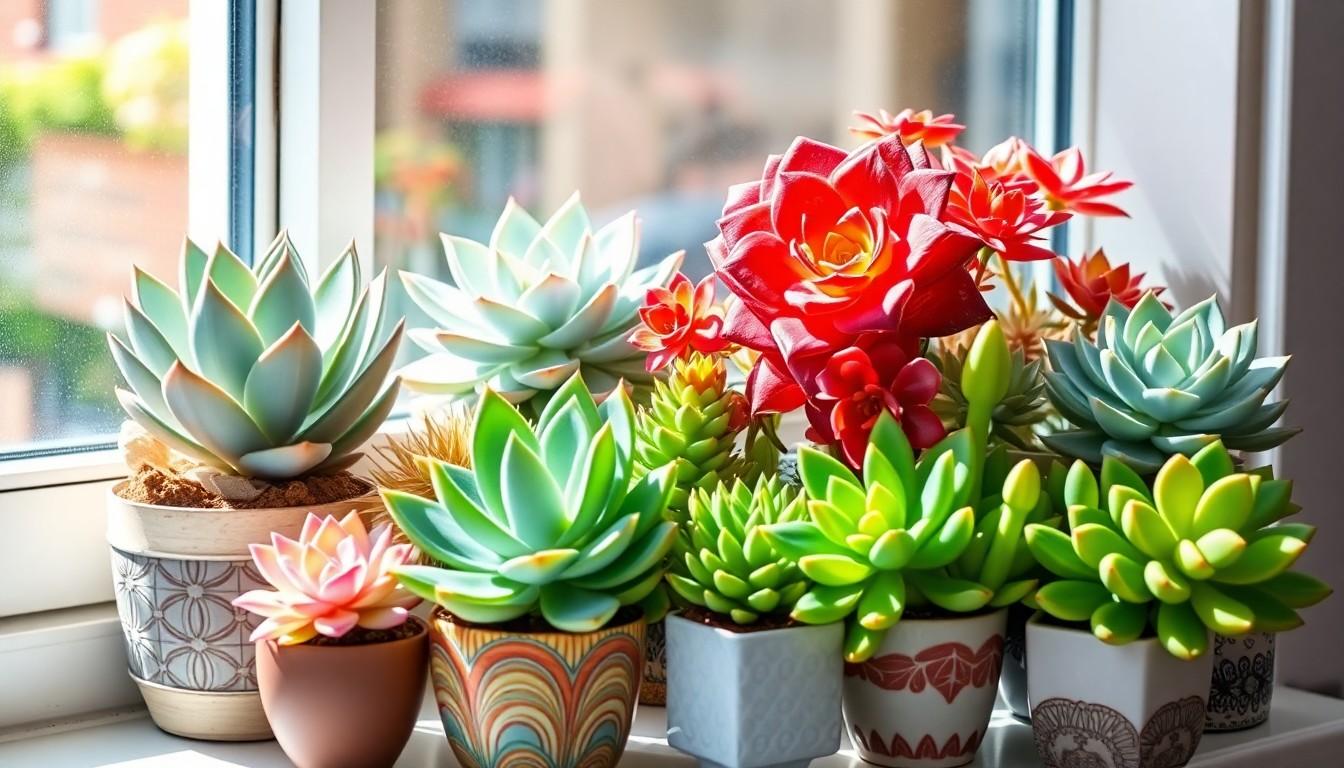The Best Fluffy Pancakes recipe you will fall in love with. Full of tips and tricks to help you make the best pancakes.

Types of Succulents: Transform Your Space with Low-Maintenance Greenery
Succulents have taken the plant world by storm, turning homes into mini desert oases. These charming little green wonders not only add a splash of life to any space but also come with a side of low maintenance. Who wouldn’t want a plant that practically thrives on neglect?
Overview Of Succulents
Succulents are unique plants characterized by thick, fleshy parts that store water. These adaptations enable them to thrive in arid environments. Many varieties exhibit vibrant colors, interesting shapes, and diverse textures, adding visual interest to any space.
Popular types include Aloe, Echeveria, and Haworthia. Aloe not only serves decorative purposes, it also offers medicinal benefits. Echeveria showcases rosette forms that come in numerous colors, making it a favorite among enthusiasts. Haworthia prefers low light, proving suitable for indoor conditions.
Growth patterns vary among succulents. Some, like jade plants, grow tall and bushy, while others, like string of pearls, tumble elegantly over the edges of pots. These plants often reproduce easily, providing opportunities for propagation through leaf cuttings or offsets.
Many succulents require specific care for optimal growth. Most prefer well-draining soil to prevent root rot. Watering schedules can vary; a thorough soak followed by dry periods achieves the best results in many cases.
Understanding light requirements is crucial for successful cultivation. Many thrive in bright, indirect light, though some tolerate direct sunlight. Observing the responsiveness of each succulent species ensures proper growing conditions and healthier plants.
Succulents appeal not just for their aesthetic qualities but also for their resilience. With a variety of species available, enthusiasts can find the perfect match for any environment or level of care. Their captivating presence transforms ordinary spaces into vibrant displays of nature.
Popular Types Of Succulents

Succulents come in many varieties, each bringing unique beauty and benefits to any space. Below are some popular types known for their aesthetic appeal and ease of care.
Echeveria
Echeveria boasts stunning rosettes of fleshy leaves, often vibrant in color. This succulent thrives in bright, indirect light, making it ideal for indoor settings. It requires well-draining soil to prevent root rot, and watering should occur when the soil dries out completely. Echeveria cultivars provide a range of colors and shapes, appealing to many plant enthusiasts. Examples include Echeveria ‘Lola’ and Echeveria ‘Perle von Nurnberg’, both known for their striking appearance and ability to adapt to various environments.
Aloe Vera
Aloe Vera is well-known for its medicinal properties, especially its soothing gel found in its leaves. This succulent prefers bright, filtered light and sandy soil to thrive. Its low water requirement makes it perfect for busy individuals. Aloe Vera can grow indoors or outdoors, showcasing its versatility. In addition to its beauty, it serves a practical purpose, with applications in skincare and health, significantly enhancing its appeal to many homeowners.
Sedum
Sedum succulents offer a diverse array of shapes and sizes, making them a popular choice among gardeners. These hardy plants can thrive in poor soil conditions and tolerate drought, showcasing resilience. Sedum prefers full sunlight, ensuring vibrant growth and colorful blooms during the growing season. Additionally, they attract pollinators, contributing to local ecosystems. Sedum acre and Sedum morganianum are two notable varieties, each with distinctive traits that add charm to any garden or indoor arrangement.
Indoor Succulents
Indoor succulents add character to homes while remaining low-maintenance. These plants showcase a variety of shapes and colors, enhancing any living space.
Lighting Requirements
Bright, indirect light proves essential for indoor succulents. Many thrive near windows providing ample light without direct sun exposure. It’s important to avoid overly dim locations; lower light levels can lead to leggy growth. Some species, such as Echeveria, flourish in around six hours of light daily. Rotating plants regularly ensures even growth on all sides.
Care Tips
Well-draining soil serves as a foundation for healthy indoor succulents. Regular watering occurs when the top inch of soil feels dry. Overwatering poses a risk; roots can rot in soggy conditions. Fertilizing during the growing season promotes robust growth; diluted fertilizers work well every four to six weeks. Dusting leaves with a soft cloth keeps plants looking their best while improving photosynthesis.
Outdoor Succulents
Outdoor succulents thrive in diverse climates, offering vibrant colors and unique shapes to gardens and patios.
Climate Considerations
Temperature affects outdoor succulents significantly. Most varieties prefer temperatures between 60°F and 80°F. Some desert species can tolerate extreme heat, while frost-sensitive succulents struggle below 20°F. Adequate sunlight is crucial; these plants often require six hours of full sun daily. Humidity plays a role as well, with low-humidity environments benefiting succulents like Agave and Sedum. Successful growth follows when gardeners select species suited to their specific climate conditions. Researching local weather patterns helps in choosing the best succulents for outdoor settings.
Soil Types
Soil quality directly impacts outdoor succulents’ health. Well-draining soil is essential to prevent root rot, with a mix of potting soil, sand, and perlite recommended for optimal drainage. Sandy soils benefit many succulents, ensuring air circulation around roots. Cactus mixes serve well in supporting various types. Testing soil pH could reveal important information, as most succulents prefer slightly acidic to neutral conditions. Creating raised beds improves drainage and warmth, fostering healthy growth and vibrant plant life.
Conclusion
Succulents offer a remarkable blend of beauty and resilience that appeals to both novice and experienced plant lovers. Their diverse range of shapes and colors can elevate any space while requiring minimal care. Whether indoors or outdoors these plants thrive in various conditions and adapt well to different environments.
Understanding the unique needs of each succulent type ensures they flourish and remain vibrant. With the right care tips and knowledge about their growth patterns and preferences anyone can enjoy the benefits of these stunning plants. Embracing succulents can transform a home or garden into a lush oasis that reflects personal style and enhances overall well-being.
